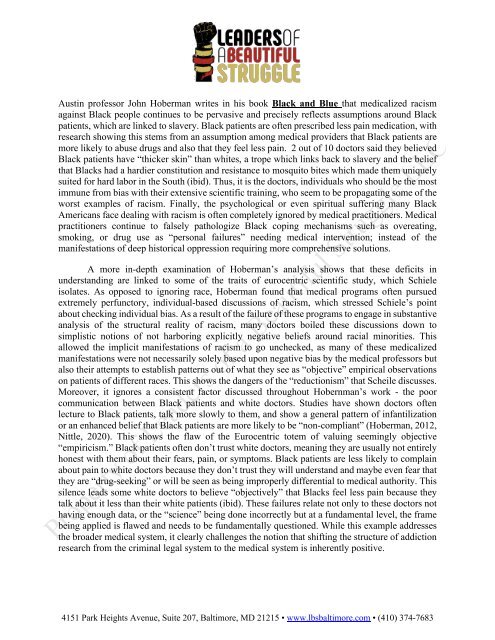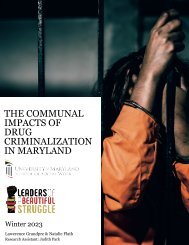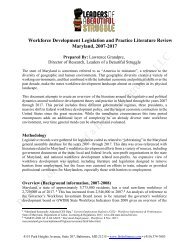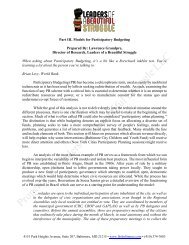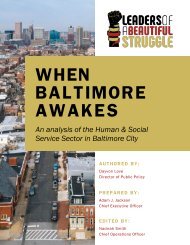Drug Decriminalization in Maryland Through an African Centered Research Paradigm- Analysis and Recommendations
This document offers guidance for theorizing questions related to a proposed research project purposed to advance drug decriminalization in Maryland.
This document offers guidance for theorizing questions related to a proposed research project purposed to advance drug decriminalization in Maryland.
- No tags were found...
You also want an ePaper? Increase the reach of your titles
YUMPU automatically turns print PDFs into web optimized ePapers that Google loves.
Aust<strong>in</strong> professor John Hoberm<strong>an</strong> writes <strong>in</strong> his book Black <strong>an</strong>d Blue that medicalized racism<br />
aga<strong>in</strong>st Black people cont<strong>in</strong>ues to be pervasive <strong>an</strong>d precisely reflects assumptions around Black<br />
patients, which are l<strong>in</strong>ked to slavery. Black patients are often prescribed less pa<strong>in</strong> medication, with<br />
research show<strong>in</strong>g this stems from <strong>an</strong> assumption among medical providers that Black patients are<br />
more likely to abuse drugs <strong>an</strong>d also that they feel less pa<strong>in</strong>. 2 out of 10 doctors said they believed<br />
Black patients have “thicker sk<strong>in</strong>” th<strong>an</strong> whites, a trope which l<strong>in</strong>ks back to slavery <strong>an</strong>d the belief<br />
that Blacks had a hardier constitution <strong>an</strong>d resist<strong>an</strong>ce to mosquito bites which made them uniquely<br />
suited for hard labor <strong>in</strong> the South (ibid). Thus, it is the doctors, <strong>in</strong>dividuals who should be the most<br />
immune from bias with their extensive scientific tra<strong>in</strong><strong>in</strong>g, who seem to be propagat<strong>in</strong>g some of the<br />
worst examples of racism. F<strong>in</strong>ally, the psychological or even spiritual suffer<strong>in</strong>g m<strong>an</strong>y Black<br />
Americ<strong>an</strong>s face deal<strong>in</strong>g with racism is often completely ignored by medical practitioners. Medical<br />
practitioners cont<strong>in</strong>ue to falsely pathologize Black cop<strong>in</strong>g mech<strong>an</strong>isms such as overeat<strong>in</strong>g,<br />
smok<strong>in</strong>g, or drug use as “personal failures” need<strong>in</strong>g medical <strong>in</strong>tervention; <strong>in</strong>stead of the<br />
m<strong>an</strong>ifestations of deep historical oppression requir<strong>in</strong>g more comprehensive solutions.<br />
A more <strong>in</strong>-depth exam<strong>in</strong>ation of Hoberm<strong>an</strong>’s <strong>an</strong>alysis shows that these deficits <strong>in</strong><br />
underst<strong>an</strong>d<strong>in</strong>g are l<strong>in</strong>ked to some of the traits of eurocentric scientific study, which Schiele<br />
isolates. As opposed to ignor<strong>in</strong>g race, Hoberm<strong>an</strong> found that medical programs often pursued<br />
extremely perfunctory, <strong>in</strong>dividual-based discussions of racism, which stressed Schiele’s po<strong>in</strong>t<br />
about check<strong>in</strong>g <strong>in</strong>dividual bias. As a result of the failure of these programs to engage <strong>in</strong> subst<strong>an</strong>tive<br />
<strong>an</strong>alysis of the structural reality of racism, m<strong>an</strong>y doctors boiled these discussions down to<br />
simplistic notions of not harbor<strong>in</strong>g explicitly negative beliefs around racial m<strong>in</strong>orities. This<br />
allowed the implicit m<strong>an</strong>ifestations of racism to go unchecked, as m<strong>an</strong>y of these medicalized<br />
m<strong>an</strong>ifestations were not necessarily solely based upon negative bias by the medical professors but<br />
also their attempts to establish patterns out of what they see as “objective” empirical observations<br />
on patients of different races. This shows the d<strong>an</strong>gers of the “reductionism” that Scheile discusses.<br />
Moreover, it ignores a consistent factor discussed throughout Hobernm<strong>an</strong>’s work - the poor<br />
communication between Black patients <strong>an</strong>d white doctors. Studies have shown doctors often<br />
lecture to Black patients, talk more slowly to them, <strong>an</strong>d show a general pattern of <strong>in</strong>f<strong>an</strong>tilization<br />
or <strong>an</strong> enh<strong>an</strong>ced belief that Black patients are more likely to be “non-compli<strong>an</strong>t” (Hoberm<strong>an</strong>, 2012,<br />
Nittle, 2020). This shows the flaw of the Eurocentric totem of valu<strong>in</strong>g seem<strong>in</strong>gly objective<br />
“empiricism.” Black patients often don’t trust white doctors, me<strong>an</strong><strong>in</strong>g they are usually not entirely<br />
honest with them about their fears, pa<strong>in</strong>, or symptoms. Black patients are less likely to compla<strong>in</strong><br />
about pa<strong>in</strong> to white doctors because they don’t trust they will underst<strong>an</strong>d <strong>an</strong>d maybe even fear that<br />
they are “drug-seek<strong>in</strong>g” or will be seen as be<strong>in</strong>g improperly differential to medical authority. This<br />
silence leads some white doctors to believe “objectively” that Blacks feel less pa<strong>in</strong> because they<br />
talk about it less th<strong>an</strong> their white patients (ibid). These failures relate not only to these doctors not<br />
hav<strong>in</strong>g enough data, or the “science” be<strong>in</strong>g done <strong>in</strong>correctly but at a fundamental level, the frame<br />
be<strong>in</strong>g applied is flawed <strong>an</strong>d needs to be fundamentally questioned. While this example addresses<br />
the broader medical system, it clearly challenges the notion that shift<strong>in</strong>g the structure of addiction<br />
research from the crim<strong>in</strong>al legal system to the medical system is <strong>in</strong>herently positive.<br />
4151 Park Heights Avenue, Suite 207, Baltimore, MD 21215 • www.lbsbaltimore.com • (410) 374-7683


